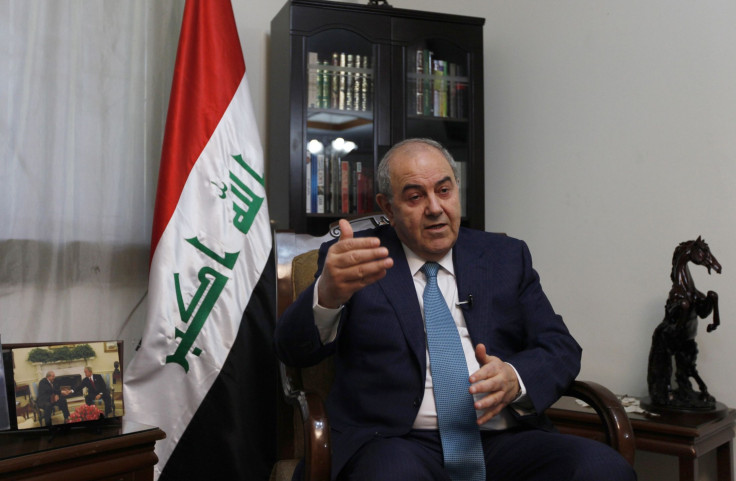Iraq's Allawi Endorses PM, Says Will Help Win Over Sunnis

BAGHDAD (Reuters) -- Iraqi Vice President Iyad Allawi endorsed Prime Minister Haider al-Abadi Sunday, a move that will be seen as a step toward reconciliation in a political system that desperately needs to rebuild to allow Baghdad to fight Islamic State.
For years Allawi, a secular Shiite Muslim, has been an outspoken critic of former premier Nuri al-Maliki whom he has accused of acting like Saddam Hussein in trying to silence his opponents.
His endorsement will lend political capital to Abadi, who comes from the same Dawa political party as Maliki but has been regarded as more inclusive.
"I frankly believe very strongly that (Abadi) understands the problems and he means well. We hope to help him," Allawi said in a Reuters interview at his home in Baghdad.
Allawi, a former prime minister, is also a key figure in reaching out to disaffected Iraqi Sunnis who Abadi hopes he can bring back to the government side to battle Islamic State.
Islamic State fighters have seized large chunks of Iraq's north and west this year. The group has been tolerated by some of the Sunni minority who accuse Shiite-led Baghdad of marginalizing their community.
Maliki's use of force against protesters deepened Sunni hatred of Baghdad, militarized their communities, sparked an armed revolt and allowed Islamic State to exploit grievances.
Until now, many Sunni tribal fighters and members of armed factions have sided with Islamic State, convinced the government is the greater of two evils.
The extent of Allawi's influence on Sunnis was shown by the 2010 election in which his coalition, which included leading Sunni politicians, won every province where Islamic State is now fighting.
Abadi has promised to offer amnesties and to stop the bombardment of cities, a move Allawi said convinced him of Abadi's resolve.
"I told [Abadi] we will be with him all the way if he moves along the right road to recovery," Allawi said.
"What we need to do is create a new political landscape where we don't discriminate against the people, we don't disenfranchise the people based on their sect, religion or beliefs," he said.
DIALOGUE
The U.S. hopes Sunni militants and tribal powers in areas dominated by Islamic State can also be persuaded to bolster U.S. air missions in the battle to destroy Islamic State.
Unwilling to commit U.S. troops after ending the occupation in Iraq, Obama hopes to build partnerships similar to those with Sunni tribes in the 2007-09 "Awakening" movement which battled al Qaeda in western and central Iraq.
Although Allawi said he was not in talks with Washington, he added he had spoken to many leaders in Sunni areas.
"I have a lot of good relations with a lot of these groups in the governorates that have been under bombardment and under siege by the ex-government," he said.
"Already I have a dialogue with some of them, and ongoing dialogue. A group of them sent a message to the prime minister indicating that they will be part and parcel of the political process."
He said that the government now has to devolve power to provinces and Sunni opposition, who led peaceful protests in 2013 that prompted a crackdown by Maliki's security forces.
"We should have incorporated some of the people who have been trying to peacefully and constitutionally to present their case in previous demonstrations," Allawi said.
"I believe we should work very hard to open up and to give them some of the demands they have been asking for. Simple demands. And frankly, very just demands. The key issue is these people have to be treated as equal citizens."
© Copyright Thomson Reuters {{Year}}. All rights reserved.





















